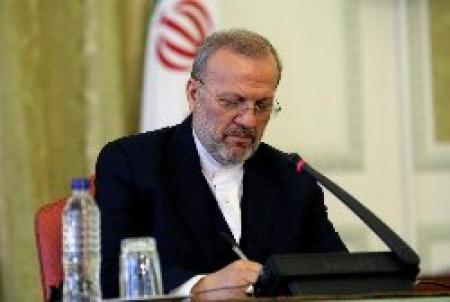ID :
122718
Tue, 05/18/2010 - 13:24
Auther :
Shortlink :
http://m.oananews.org//node/122718
The shortlink copeid
Mottaki meets Indian-Nigerian FMs, Belarusian PM

Tehran, May 18, IRNA – Iran's Foreign Minister Manouchehr Mottaki met and conferred with his Indian and Nigerian counterparts and the Belarusian prime minister on Monday night.
During the meeting, Mottaki is stated to have told his Indian counterpart S.M. Krishna, “After the end of the cold war era, regional groups have spent a hag period of relative stagnation for some 15 years,” according to the Information and Media Affairs Head Office of Iran's Ministry of Foreign Affairs.
Mottaki added: “During that time, some people had assumed that unilateralism would replace the former bipolar world order,” further stating that “They had even come up with the idea that they could very easily move their troops to this and that side of the world and wage wars and we then began the new century amid such an atmosphere. But after the passage of the first decade of the 21st century they realized that the truth of the matter was otherwise.”
Mottaki said, “India can, as an influential country, play a very decisive role in the region.”
Krishna, for his part, congratulated Mottaki for the successful G-15 Tehran Summit, reiterating: “We too, are agreed with you that world conditions have changed and many of the formerly established foundations need to be drastically altered and reshaped, since they are today incapable of heeding the commitments and responsibilities they were commissioned to perform initially.”
Krishna added, “Proof for the claim is that we are not witnesses to any positive moves, or presentation of any brilliant ideas by those organizations, and therefore, we, as developing countries, need to take lessons from the emerged conditions, adapt ourselves with the new situation, and take advantage of the entire opportunities for exchanging ideas.
Mottaki also met and conferred with the Belarusian first deputy foreign minister Semachko and the Nigerian consultant foreign minister Elio Hong.
Mottaki and the Belarusian deputy PM exchanged ideas on ways for expansion of bilateral relations, particularly on economic cooperation.
Both sides were agreed that long time planning was needed in order to ensure sustainable expansion of cooperation within the framework of regional organizations, including the G15.
In his meeting with the Nigerian official, Mottaki once more consoled with the government and people of that country on the recent sad demise of their late president.
Mottaki meanwhile called for the exploitation of the entire existing potentials and facilities at both ends aimed at boosting bilateral relations.
Mottaki added, “Our countries both enjoy special statuses both at the G-15 and at the D-8 and therefore cooperation between Tehran and Lagos at international scenes can have positive results.
The Nigerian official, too, thanked Mottaki for the good organization and success of the G-15 Summit and called for full implementiaon of the formerly reached agreements./end
During the meeting, Mottaki is stated to have told his Indian counterpart S.M. Krishna, “After the end of the cold war era, regional groups have spent a hag period of relative stagnation for some 15 years,” according to the Information and Media Affairs Head Office of Iran's Ministry of Foreign Affairs.
Mottaki added: “During that time, some people had assumed that unilateralism would replace the former bipolar world order,” further stating that “They had even come up with the idea that they could very easily move their troops to this and that side of the world and wage wars and we then began the new century amid such an atmosphere. But after the passage of the first decade of the 21st century they realized that the truth of the matter was otherwise.”
Mottaki said, “India can, as an influential country, play a very decisive role in the region.”
Krishna, for his part, congratulated Mottaki for the successful G-15 Tehran Summit, reiterating: “We too, are agreed with you that world conditions have changed and many of the formerly established foundations need to be drastically altered and reshaped, since they are today incapable of heeding the commitments and responsibilities they were commissioned to perform initially.”
Krishna added, “Proof for the claim is that we are not witnesses to any positive moves, or presentation of any brilliant ideas by those organizations, and therefore, we, as developing countries, need to take lessons from the emerged conditions, adapt ourselves with the new situation, and take advantage of the entire opportunities for exchanging ideas.
Mottaki also met and conferred with the Belarusian first deputy foreign minister Semachko and the Nigerian consultant foreign minister Elio Hong.
Mottaki and the Belarusian deputy PM exchanged ideas on ways for expansion of bilateral relations, particularly on economic cooperation.
Both sides were agreed that long time planning was needed in order to ensure sustainable expansion of cooperation within the framework of regional organizations, including the G15.
In his meeting with the Nigerian official, Mottaki once more consoled with the government and people of that country on the recent sad demise of their late president.
Mottaki meanwhile called for the exploitation of the entire existing potentials and facilities at both ends aimed at boosting bilateral relations.
Mottaki added, “Our countries both enjoy special statuses both at the G-15 and at the D-8 and therefore cooperation between Tehran and Lagos at international scenes can have positive results.
The Nigerian official, too, thanked Mottaki for the good organization and success of the G-15 Summit and called for full implementiaon of the formerly reached agreements./end





